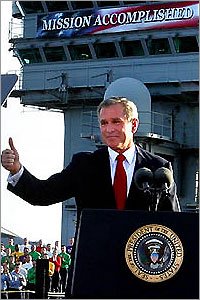
In Iraq, Bush Pushed
For Deadline Democracy
Timeline Yields Constitutional Order, Not Peace
By Peter Baker and Robin Wright, Washington Post Staff Writers
Whenever he was asked in public last winter about the prospect of delaying Iraq's first election since the fall of Saddam Hussein, President Bush flatly dismissed it. His administration, he insisted, was "very firm" on going forward.
When U.S. administrator L. Paul Bremer transferred sovereignty to Iraqi authorities in June 2004, he left behind a script with hard-and-fast deadlines for drafting a constitution and forming a government, a script that culminates Thursday with another election for a permanent parliament. The story of the 18-month process that unfolded after Bremer left Baghdad was one of steadfast fidelity to the script, as well as a costly period of U.S. inattention and endless frustrations with squabbling Iraqi leaders, according to a wide array of Bush advisers, Iraqi politicians and others involved in the effort.
While Bush refuses to set a timetable for military withdrawal, he has stuck doggedly to the Bremer political timetable despite qualms of his staff, relentless violence on the ground and disaffection of Iraq's minority Sunni Arabs. "The key for a long time in Iraq to stabilization . . . has been to pull in significant elements of Sunnis near the insurgency into the political process," said Larry Diamond, a Stanford University scholar who for a short time advised U.S. authorities in Iraq, only to become a scathing critic. The press to meet the Bremer deadlines, starting in January, he said, only fueled the militants. "Much of the violence after that was entrenched or reinforced by the elections when the Sunnis were pressed to the margins."